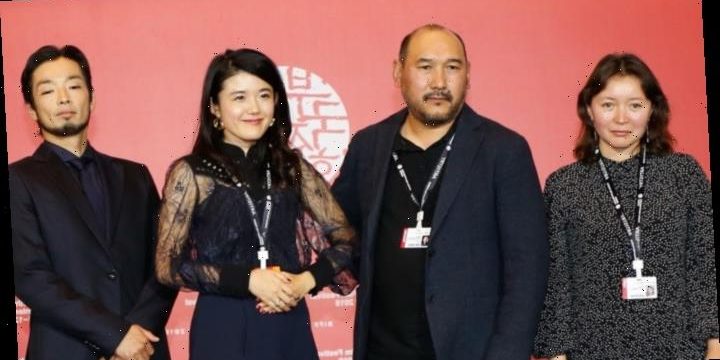Audiences watching Busan’s opening night film “The Horse Thieves” will get to see a universal and somewhat linear tale of greed, cruelty and man’s uneasy place in nature. Behind the scenes, however, it was a learning and co-operative experience between film makers from different cultures.
A rare Kazakhstan-Japan co-production, “Horse Thieves” was co-directed by Yerlan Nurmukhambetov and Japan’s Lisa Takeba. It stars Samal Yeslyamova, Cannes prize winner for her performance in “Ayka,” opposite Japanese heart throb Moriyama Morai, known for his roles in “Rage” and 2004 smash hit “Crying out Love in the Center of the World.”
Having agreed to cooperate, the two directors held multiple, prolonged Internet phone calls in order to shape the story and the script. They examine the consequences that flow from the slaying of a horse farmer who had taken his flock to market.
“Our initial plan on the set was for a division of labor, with Yerlan (Nurmukhambetov) directing the Kazakh cast, and me directing the Japanese talent,” said Takeba. “However, things evolved and Yerlan, himself an actor, came to handle the performances, while I became more responsible for things like continuity.”
Other kinds of flexibility were also necessary, as the story was revised during production. Where Takeba sought a dramatic ending, Nurmukhambetov favored an emphasis on family and the boy whose father is killed. Instead, they settled for a fade out that intercuts action and static shots focused on paintings. “It really showed me something about flexibility that (Nurmukhambetov) was able to change the story while we were making the picture. In Japan, everything to do with making a film must be planned out beforehand,” said Takeba.
Moriyama revealed that back in Japan, prior to the shoot, he had spent much time discussing his role with Takeba. (Moriyama appears in the second reel as a mysterious stranger, whose role increases in importance.) Speaking no Kazakh, he had to learn his lines phonetically. “That limited the room I had for improvisation,” Moriyama said, though he too praised Nurmukhambetov for his ability to switch story, and locations mid-shoot.
Takeba suggests that the boy losing his father is a parallel to Kazakhstan separating from the former Soviet Union. But such a read is not especially necessary.
The finished film, which Yeslyamova and Moriyama saw for the first time at a Busan press screening, is an accessible wide-screen epic, a tale of stunning landscapes, a boy’s shattered childhood, and woman’s unchanging place in hardscrabble, traditional society.
Source: Read Full Article
